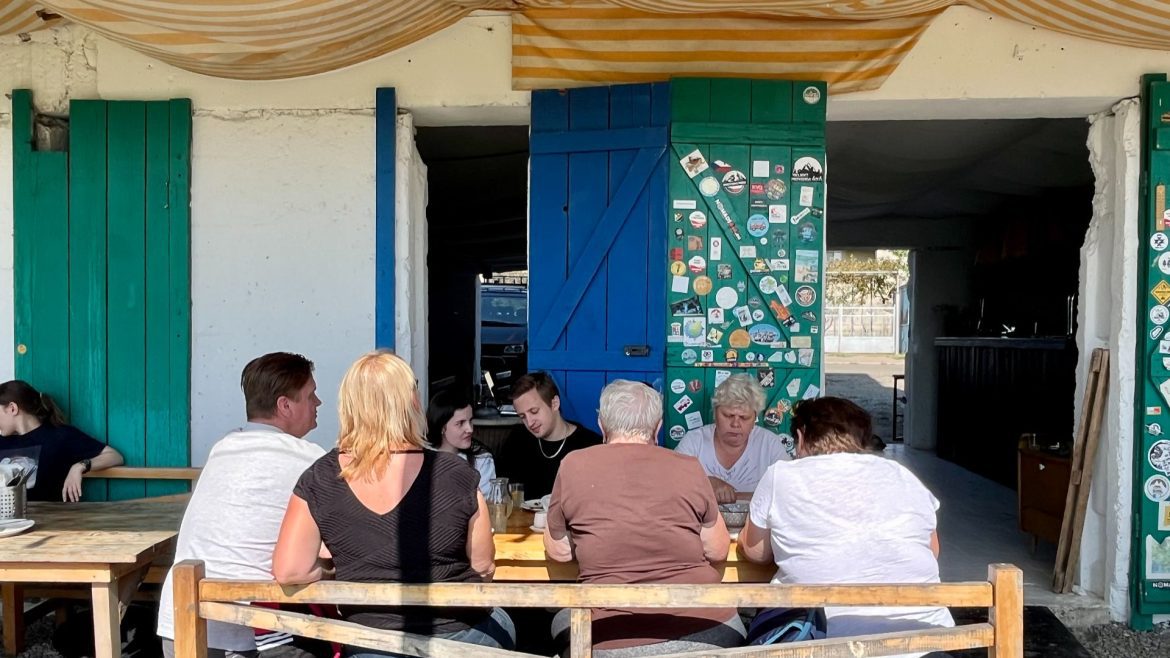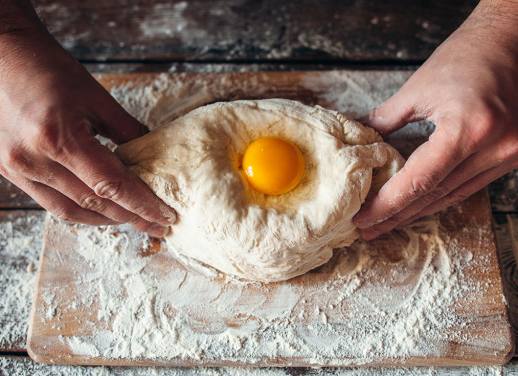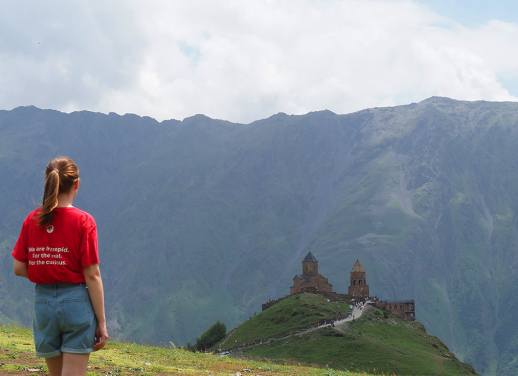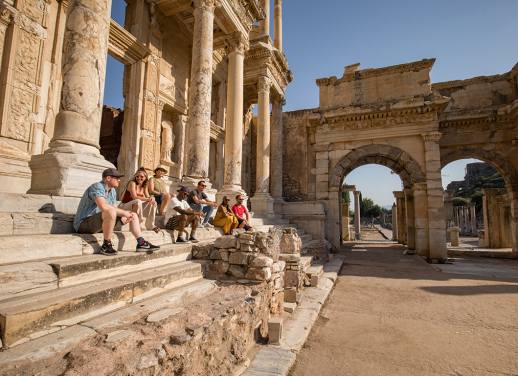Backstreet bakers and ebullient local hosts reveal a warm welcome in the capital Tbilisi, discovers writer Alison Spencer.
Walking down Davit Agmashenebeli Avenue towards dinner at the home of Mary and Edward Tokmachyan, I replay an earlier encounter with a local Tbilisi baker in my mind.
Searching for lunch, I’d entered a cafe to source food and continue walking. But soon, I’d found myself seated at a table sipping homemade chacha (potent Georgian grape brandy), nibbling on chocolate and accepting the owner’s offer of a baking demonstration.
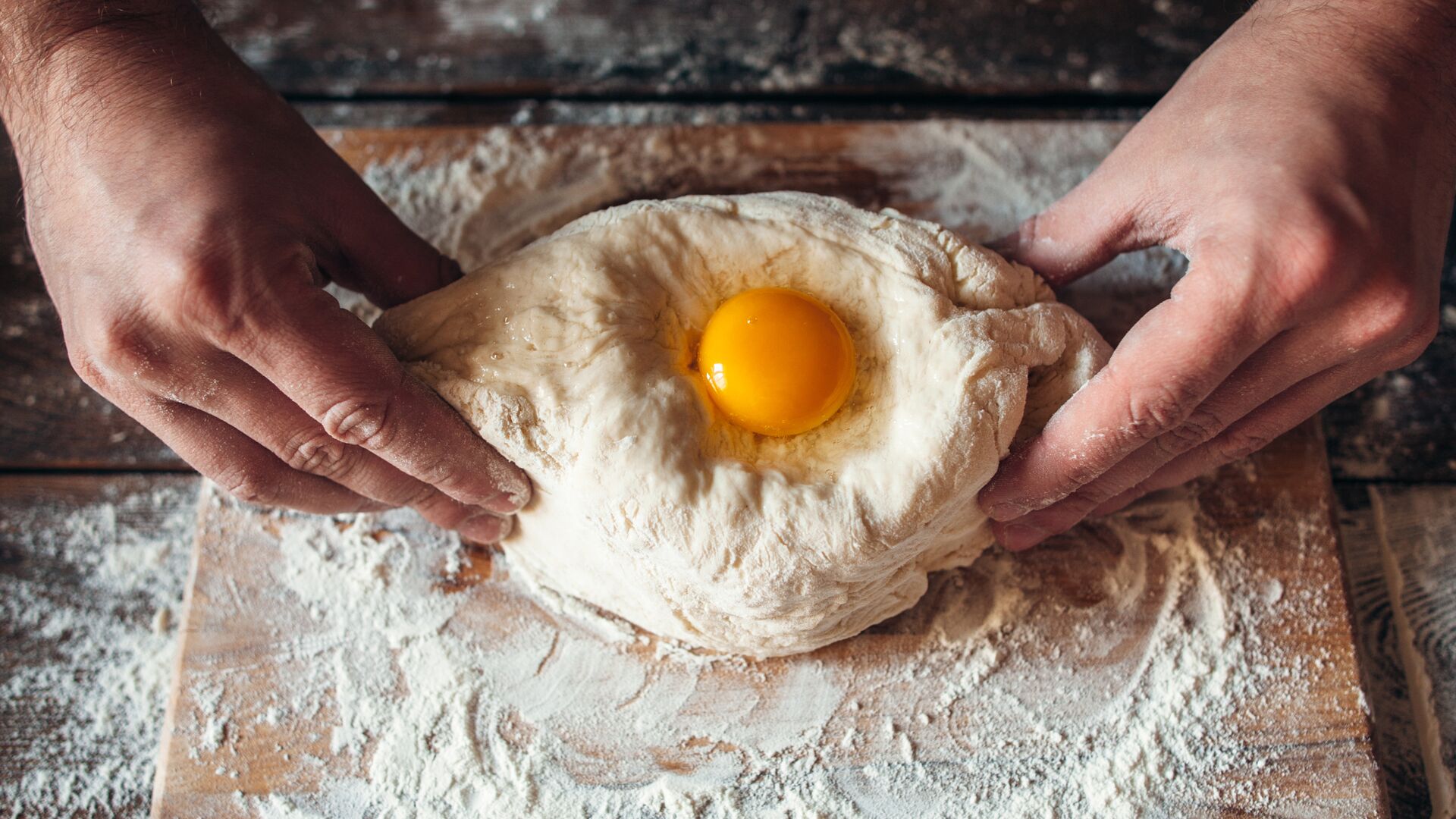
Following Giorgio into the kitchen, I’d watched as he stretched freshly kneaded dough over a mould, smacked it onto the wall of the tone (traditional oven) and removed each loaf once crisped.
Holding the puri (bread), Giorgio insisted I tear off a piece, adamant it’s best sampled when hot, even if the remainder could no longer be sold. He then handed me my lunch order, wished me well and I set off to enjoy the most delicious khachapuri I’d ever tasted – savouring the traditional Georgian bread-based dish, typically loaded with egg or cheese.
The interaction had taken 20 minutes, but it had stuck with me, thanks to Giorgio’s sincerity and eagerness to share his craft. I’d been on the lookout for a simple meal and had found something unexpected – immeasurable kindness and a generosity of spirit that made the cobbled streets I currently strolled seem smoother, the restaurants feel livelier and the lights shine brighter.
Read more: Must see places to visit in Georgia


The art of hospitality
Climbing the stairs to the Tokmachyans’ apartment to rejoin the small-group trip I’m currently on through Azerbaijan, Georgia & Armenia, I can’t imagine anything or anyone matching the goodwill I’d experienced with Giorgio. Yet, when the door opens – and we’re greeted with hugs and a palpable sense of excitement – I begin to wonder if this warmth isn’t a one-off. If instead, it’s woven into the fabric of Georgia and its people.
Upon entering, the father-daughter duo tours us through their Tbilisi apartment. Built in 1908, each room boasts its own history and insight into Georgian life, holding family photos and historical maps showing USSR territories that have since been renamed.
Walking through the library, Mary recounts her grandparents tutoring her to ensure she earned one of the much-coveted university spots during Soviet times. In their office, we learn of Edward’s transition from engineering to painting, its walls covered in his sketches and artworks.



Raise your glass to the toastmaster
Then comes the dining room, in the centre of which stands a table cradling lit candelabras, carafes of wine, vases of pink blossoms and a spread unlike any I’d seen – mchadi (corn bread), salty cheeses, boiled eggs, beetroot and spinach balls, cucumber salad, chestnuts, olives, tomatoes with nadugi cheese… My stomach grumbles.
Settling into our seats, Edward lifts his wine glass to offer a welcome toast. He speaks unscripted about his appreciation of our visit and the importance of guests in Georgia.
Pausing to allow Mary time to translate, Edward explains that Tbilisi means ‘a warm place’, due to the city’s numerous hot springs. However, he continues, it also encapsulates their attitude toward others – one of embrace and acceptance. His message creates instant comfort, encouraging us to sink into the meal and the present place and time.
Read more: The best Georgian dishes to eat in Tbilisi
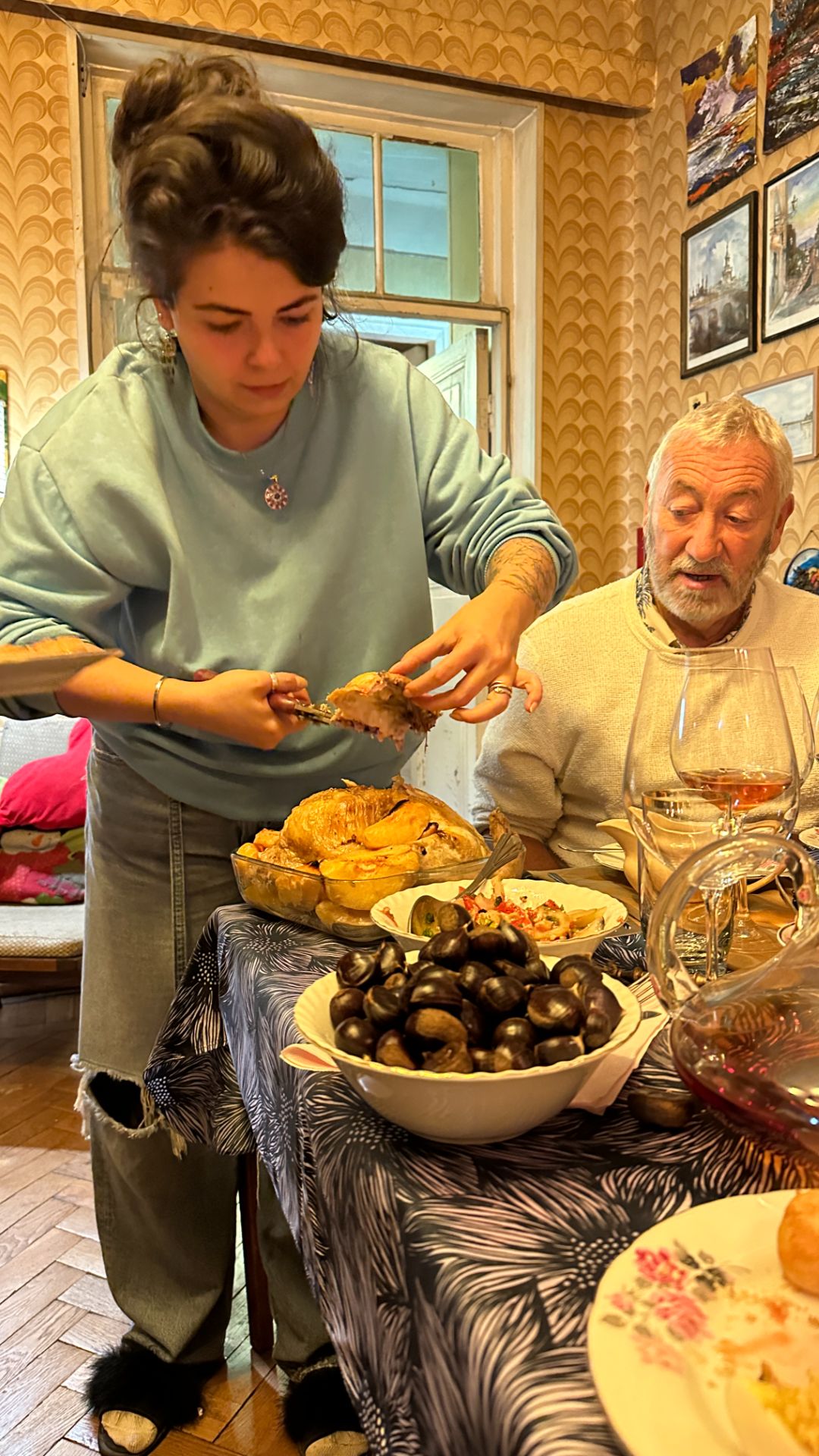

According to our local Intrepid leader Yulia, Edward’s heartfelt speech is central to the supra (communal Georgian feast) experience and part of a custom known as tamada, where one person takes on the role as master of ceremonies or ‘toastmaster’.
Typically taken on by the head of the household (in this case, Edward), the individual is entrusted with the task of gathering people around the table, breaking bread and guiding everyone through a series of thoughtful tributes.
The tamada orchestrates the meal, gauging the mood of their guests, lifting spirits and calling for communal toasting at the perfect moment to ensure the flow of conversation, the connection between guests and laughter that never falters.
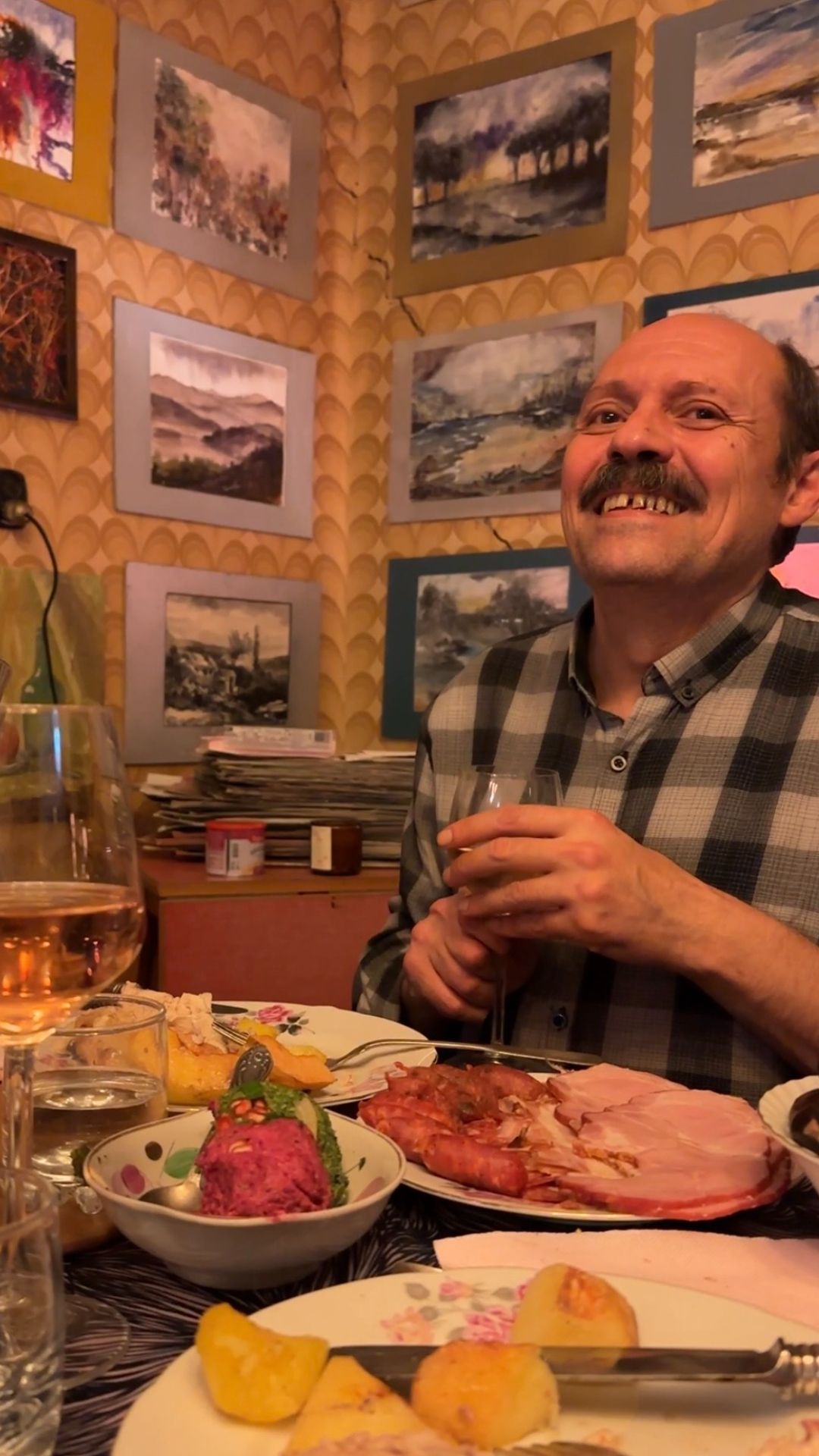

Community and a common language
As the evening progresses, we chat, eat, laugh, and, of course, drink fabled Georgian wine, grown in the soil of the world’s oldest wine region. Edward offers two more cheers: one to parents and the other to peace, wishing for us all to find a common language to express and resolve our differences.
While this might seem ironic, with him speaking Georgian and Mary translating into English, it feels the exact opposite; his words bind me closer with those in the room – from New Zealand, Canada and the United Kingdom – as though our common language was this shared experience.
Edward then extends an invitation to any of us who want to speak. Unsure if we should, Yulia notes that while the tamada is customarily held by men, the toastmaster can pass the role on to attendees at any time during the meal. The extension is not mandatory but an opportunity for others to express their sentiments towards those gathering. A quick glance around the table reveals no one feels prepared to match Edward’s eloquence, so the dinner continues unabated.
We raise our glasses four more times throughout the supra as tradition dictates a total of seven. As we eat roast chicken and vegetables, Edward pays tribute to the city of Tbilisi and to us finding our other halves; while finishing our last bites, he toasts in celebration of siblings and of companionship. In his tribute to brothers and sisters, Edward mentions that the Georgian language has two words for the term ‘friend’: dakhali (which translates to sister-woman) and dzmakaci (meaning brother-man).
Explaining more, he continues: ‘This reveals a lot about the bond inside our families – but also that whenever we approach a friend, we meet them as our brother and our sister’.



A feast fit for a family
It suddenly all makes sense. Giorgio sharing his bread and his bakery; gallery owners pouring me wine as I browsed; families like the Tokmachyans opening their home for extravagant meals. These gestures represent precisely how Georgians see the world: as a place in which food forges connection; where we are all part of – and welcomed into – the same family.
I think back to the statue we’d passed earlier that day in Tbilisi’s Old City on Jan Shardeni street: of a man relaxing in a chair lifting his drink up toward the sky. The tamada toasting to and inviting everyone into his country and his home.
‘So, here’s to great health – and the best of everything to your brothers and sisters or those you call your siblings. Let them be very healthy next to you,’ Edward concludes.
We raise our glasses to each other one final time, as both friends and a newly found family, feeling never more at home while being so far away.
Alison experienced the supra on Intrepid’s Premium Azerbaijan, Georgia and Armenia trip.

